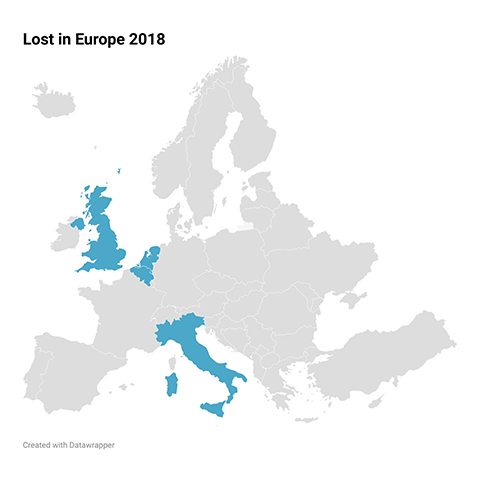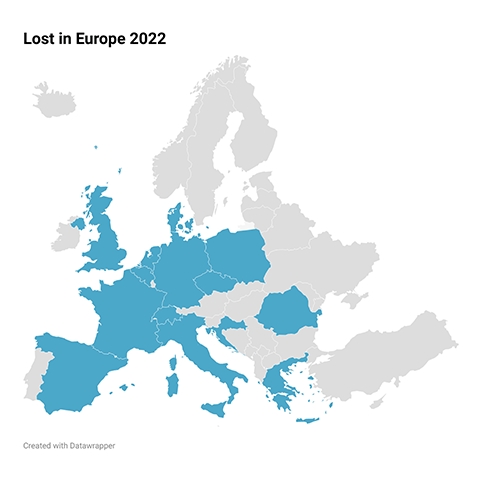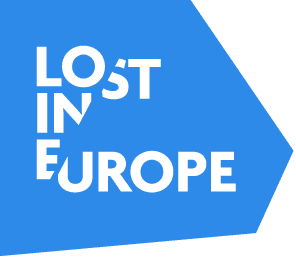When asked to describe the highlights of Lost in Europe in 2022, I looked back on a year that really flew by. The post-corona year became a year in which we completed all the goals we set 3 years ago at breakneck speed. In fact, 2022 is also the conclusion for us of the three-year grant we receive from the Dutch National Postcode Lottery.
This spot therefore seems like a good opportunity to mention what we have achieved in the past three years with the team of investigative journalists, but also with all the people around our team who have worked with us. In particular, I would like to mention project coordinator Rianne Verbeek from partner organisation Free Press Unlimited, who sadly passed away this year, but who kept a close eye on our goals like a true watchdog. With her critical eye in the back of my mind, I trust that what I describe here would meet with her approval. And those who know her know that she would surely find one or two more improvements in my text.
When Sanne Terlingen and I set up Lost in Europe in 2017, we had asked the central question of what was going on with those 10,000 children who, according to Europol, had gone missing in Europe in 2015 after registration. Had they already been found? Why weren't we hearing anything more about them?
Our approach was immediately cross-border; after all, human trafficking organisations also work across borders. We did start close to home in 2 countries: The Netherlands and Belgium.
Lost in Europe's operating area quickly expanded. At the world conference for investigative journalists (GIJN) in Johannesburg in South Africa, we met Ismail Einashe from England and Cecilia Ferrara from Italy, who joined Lost in Europe. Together, we published about Vietnamese minors who disappeared from Dutch protected shelters and turned up in England, and we organised a data bootcamp to calculate how many migrant children had disappeared after registration in Europe in 2017: at least 7024 minors in one year period.
Free Press Unlimited saw the potential of the journalists collective and presented us to the National Postcode Lottery for support to create the infrastructure journalists need to work together cross-border. This led to the commitment of three-year funding for 2020, 2021 and 2022.
As if the devil played with it, the start of that project period coincided exactly with the Corona outbreak in Europe. That did not make it any easier to achieve the already ambitious goals we had set ourselves. Suddenly, we could no longer meet physically to conduct research. Moreover, Corona cancelled many assignments of the freelance journalists we were working with, making things difficult for them personally and making Lost in Europe their only form of income. Fortunately, we were able to keep working and the infrastructure of video calling and information sharing was improving. We published dozens of articles and radio reports with Europe's biggest media outlets from BBC to De Standaard to El Mundo. Our publications have political impact. They lead to Parliamentary questions, investigations by Ombudsmen and knowledge institutes and police raids took place at hiding addresses where victims of human trafficking were being held.
We also reach huge audiences; a recent piece by Ismail Einashe made the front page of the BBC and had 655,000 clicks in the first week of publication. And there is collaboration in chain investigations; Journalists Jan Wiese and Adrian Bartocha made a documentary for national television in Germany about the human trafficking networks behind the disappearances of Vietnamese children that Sanne Terlingen and Huub Jaspers previously published about for public radio station VPRO Argos in the Netherlands. Also in Belgium, Kristof Clerix at Knack, Roeland Termote and Wouter Woussen at De Standaard and Doruntina Islamay at VRT published about this form of human trafficking. The most dramatic point in this investigation was the tragedy in Essex where 39 Vietnamese migrants were found in a refrigerated container that had been transported from Zeebrugge in Belgium to England. No one survived the crossing. Myria, the National Rapporteur on Human Trafficking and Human Smuggling in Belgium announced this month that 38 of the 39 people found there had also been in the Netherlands before their journey to England and that many of them had strong ties in Germany. Cross-border investigations remain crucial for us.
Our journalistic work has been rewarded in recent years. Last year, the entire Lost in Europe team was awarded the IJ4EU impact award for this investigation into the disappearances of Vietnamese minors in Europe. Our Belgian journalists won the Belfius press award and our German journalists were also awarded for their investigative journalistic work. Unfortunately, due to Corona measures, even the award ceremonies had to take place online. So no highfives and no toasts with clinking glasses. We worked with a growing collective of now more than 20 investigative journalists, most of whom only knew each other with their heads and shoulders in a screen.
It wasn't until March 2022 that we had the chance to meet live. On training days organised especially for the Lost in Europe team, we met (mostly for the first time) in London. There, the team was trained in trauma-aware reporting, digital safety, journalistic storytelling in creative expressions and we gained more insight into the specific sources that Lost in Europe journalists report on. The Big Leaf foundation gave us extensive insights on the aftercare they have to give minors after an interview with a journalist and how much impact our work has on them. That awareness is precious to us.
I conclude by listing the goals we have set and achieved for the National Postcode Lottery's three-year project grant;
- A digital platform is operational, on which our investigative journalists collaborate securely and whistleblowers from across Europe can share information safely.
- Lost in Europe's journalist team expanded from 6 to 14 countries.
- Together, the investigative journalists provided 158 articles and 23 radio and TV broadcasts of at least 30 minutes. These found their way to an audience of millions in Europe through member media and were published on the Lost in Europe website.
- Some 50 (starting) journalists were intensively retrained during physical training sessions and over 80 journalists attended online courses on children's rights, criminal network investigations, trauma-aware reporting and European migration issues.
- In many, over 20, European countries, Lost in Europe journalists attended as speakers at public events and our mobile exhibition has so far been exhibited in 3 countries.


Looking back, we have achieved a lot in the past three years. And, ambitious as we are, we want to do more. Publish more and collaborate more, with even more media partners to tell the stories of Europe's missing children. We are now working again on research that will come out with in early 2023. These are stories about organised crime around asylum centres, enforced labour by minors in Europe, their debt problem and pushbacks at Europe's internal borders.
We will let you hear from us,
Geesje van Haren
Project coordinator and co-founder Lost in Europe

